If you’ve ever explained to someone how a gadget or app or website works, you’ve probably used a construction like “it lets me” or “it lets you”. You probably didn’t know you were on the cutting edge of language change.
Language change isn’t immediately noticeable to those who are experiencing it–we notice when other groups start to speak differently, but it’s unlikely that our own linguistic habits will strike us as odd or innovative. That’s one reason why Ben Schmitt’s Prochronisms site is such fun: by analysing TV scripts from Mad Men and Downton Abbey, and comparing them to corpora from the same periods, he identifies locutions that have evaded the scriptwriters’ attempts to anachronize their dialogue (e.g. shenanigans, techniques, OK, your mum and goal is to, all spoken in Downton Abbey, are unlikely to have been used in the real post-Edwardian England).
Often it’s the usages that seem the most unremarkable to us that can be the most interesting when they are shown to be highly uncharacteristic of the recent past. So it is with the phrase “lets you,” which popped up as a relatively unlikely bigram for Mad Men‘s Don Draper to be using (he says, “your mother lets you do that?”). Relatively, in that “lets you” is much, much commoner now than it was then]. Schmitt gives us the following two graphs, from Google’s n-Gram viewer, which plots relative frequencies of search terms in the Google Books corpus [click to biggen]:
As you can see, “lets you” is relatively rare until about 1980, at which point it spikes dramatically in frequency. What’s going on (Schmitt asks)? His first idea was to try out different applications of “lets you”. Draper says, “Your mother lets you do that” – perhaps “lets you do” is a fixed phrase that catches on? Not according to the following graph, which shows an even greater spike with “lets you see”:
So we need a new hypothesis, and some new data and graphs. My hunch would be to look at the other side of the “lets you” bigram. To maximize the capture of data, let’s abstract “Your mother” to “she”:
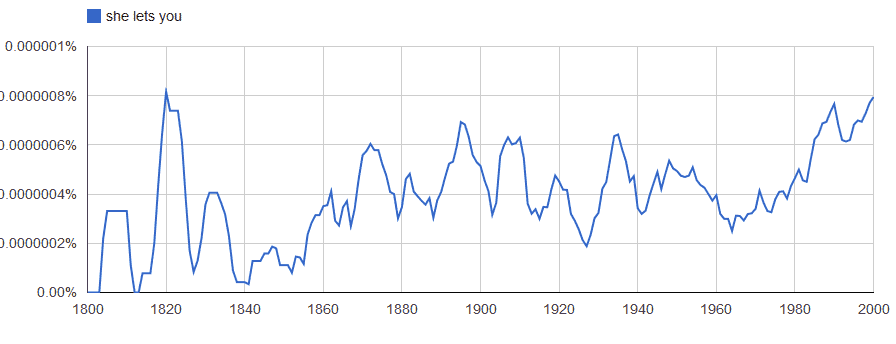 A very different picture. No “hockey stick”, and not even a real positive trend, although things look steadily upwards from about 1960 on (which is when Mad Men is set – could Don Draper have coined “lets you”?).
A very different picture. No “hockey stick”, and not even a real positive trend, although things look steadily upwards from about 1960 on (which is when Mad Men is set – could Don Draper have coined “lets you”?).
So what accounts for the “lets you” spike, if not locutions like “Your mother lets you”? The following n-gram chart tells the story:
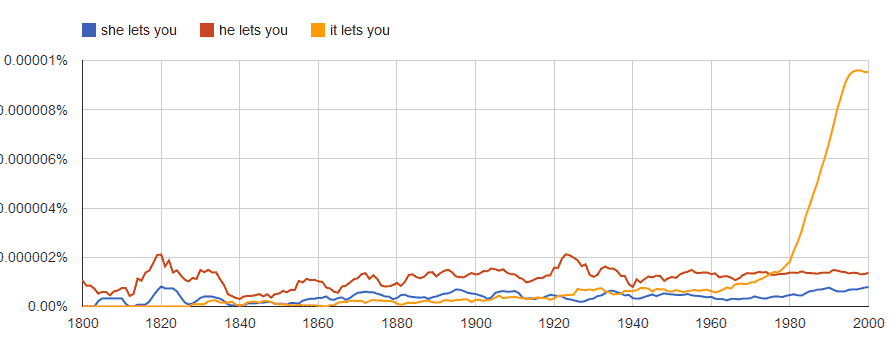 It’s the third person singular neuter that is driving essentially all “lets you” growth after 1980. And in fact it’s not the verb “let” itself that is the innovation, but rather the use of the concept of “letting” to express that non-humans can make certain things possible. In fact the synonym “allow” produces an even sharper spike, at around the same time:
It’s the third person singular neuter that is driving essentially all “lets you” growth after 1980. And in fact it’s not the verb “let” itself that is the innovation, but rather the use of the concept of “letting” to express that non-humans can make certain things possible. In fact the synonym “allow” produces an even sharper spike, at around the same time:
Google lets you look at some of the book data, and if you clued in to the absolutely unremarkable start of this sentence, you may already have a guess as to the kind of thing that’s here. Here are some examples from the 1980s:
- BetaScan lets you go fast forward or reverse without interrupting the image on the screen. [Newsweek, vol 96, 1980]
- BUILD lets you build a file of DOS commands [Byte, vol.6, 1981]
- TalkTalk is a headphone with a boom mike that lets you talk hands-free with someone else blocks away. [Popular Science, Dec. 1981]
- What says you’re mortal? Death. What lets you be immortal? Death. [Samuel Hazo, To Paris: Poems, 1981]
- And no VCR lets you get more out of television than RCA’s new SelectaVision 650. [Popular Mechanics, Nov. 1981]
- Now there’s Porta-Probe! Porta-Probe is a high intensity flashlight with a gooseneck extension and a handy alligator clip. The gooseneck lets you point the light in the direction you need it. The alligator clip lets you attach Porta- Probe where you’re working. [advertisement in Kiplinger’s Personal Finance, Nov. 1983].
- You can quantize music, moving everything to the nearest specified note value; this lets you smooth out rhythmic rough spots. [PC Magazine, 30 Oct 1990]
So my guess is that the Google Books corpus (the basis for n-grams frequencies) starts to reflect this change in the use of lets/allows especially well with the incorporation of technical discussions in print media, and especially with the proliferation of computing magazines in the early 1980s. So Draper’s use is not really anachronistic at all–mothers were “letting” kids do things in the 1960s, only machines weren’t.
PS. “Let”, just by the way, is a paleoantagonym: let, v.1 (“to allow”; from O.E. lǽtan) and let, v.2 (“to prevent”; from O.E. lęttan), were in concurrent use from the ninth century until the latter became restricted to archaic and poetic writing after the late seventeenth century, and fell out of use completely after the nineteenth.
PPS. If you like playing with Ngrams, and if you have a healthy suspicion of what can be gleaned from them, LL has a recent analysis of Ngrams in a journal paper on “the changing psychology of culture.“
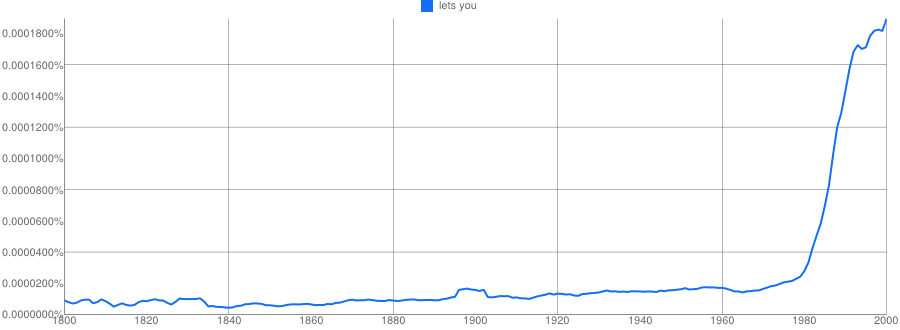
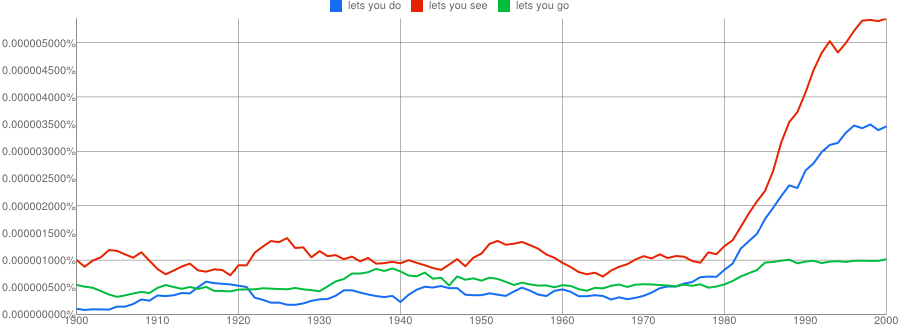
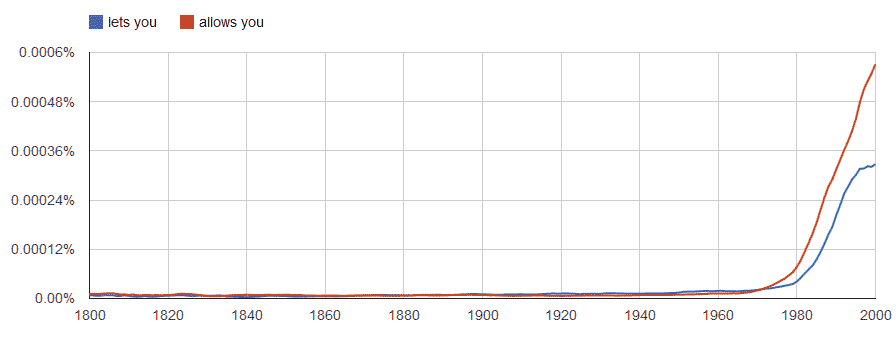
Fascinating! I just grepped for “it lets you x” in my copy of Google’s 4-gram database (from 2006) and the top three occurrences of x were:
“create” (6579 hits)
“know” (6955 hits)
“expand” (14799 hits)
I also found:
“get” at 1807 vs “give” at 107
and:
“play” at 1643 vs “work” at 402″
Interesting. “Know” might be influenced by the fixed expression “let(s) you know” (=alerts you, not makes it possible for you to know something). “Expand” is a bit surprising. Here are the graphs for some of those phrases, 1900-2000 (all basically unattested before 1900):
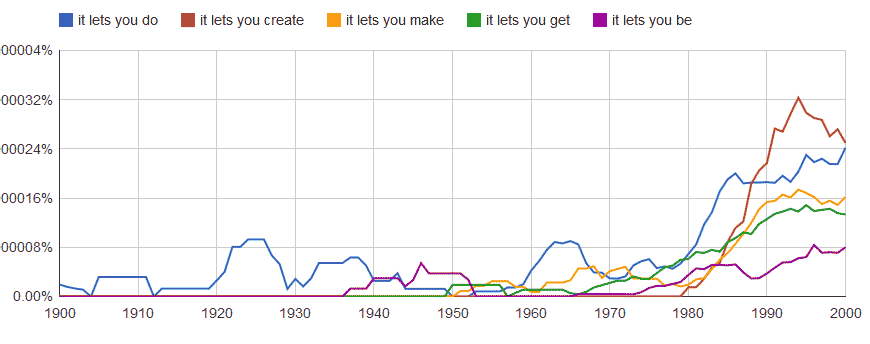
Yeah, was just thinking that. I’m just trying to see if I can use the 5-gram database to reveal what “it lets you expand”! I’m guessing it’s going to be “it lets you expand your” in which case (since I have no 6-grams) I’ll bootstrap to look for “lets you expand your x” and find x. This may take a moment …
OK so I was right that “your” is the most-frequent value of x in “it lets you expand x” but check out the almost unbelievably apt solution x for “lets you expand your x”. Here are the top three by frequency:
lets you expand your cruising 213
lets you expand your Spanish 311
lets you expand your vocabulary 14732
!
Anyway, it’s late here. I’ll leave you calculating and this zeugma.
Now I’ve had a look at the Google 2012 (v2) 4-gram set, and either the data are very different, or ON and I are using methods that don’t agree. Below are all the instances of “it lets you X” in the corpus, with total appearances in all years on the left. Note that there is no “expand” at all (!), even though I get 987 counts of “it lets you expand” in Google books. “Know” and “create” are up there, along with see and use.
3190 it lets you know
1704 it lets you see
1197 it lets you create
906 it lets you use
866 it lets you specify
822 it lets you do
625 it lets you choose
564 it lets you get
528 it lets you set
516 it lets you make
510 it lets you select
472 it lets you change
449 it lets you add
439 it lets you take
361 it lets you easily
347 it lets you view
342 it lets you move
331 it lets you down
315 it lets you control
314 it lets you keep
305 it lets you work
295 it lets you define
277 it lets you be
267 it lets you write
265 it lets you run
260 it lets you search
254 it lets you enter
254 it lets you look
245 it lets you access
241 it lets you have
239 it lets you go
235 it lets you quickly
230 it lets you off
222 it lets you put
209 it lets you find
208 it lets you edit
204 it lets you start
198 it lets you send
188 it lets you build
187 it lets you play
186 it lets you save
182 it lets you open
180 it lets you adjust
171 it lets you ”
166 it lets you record
165 it lets you store
165 it lets you test
161 it lets you out
160 it lets you print
157 it lets you determine
154 it lets you type
152 it lets you perform
145 it lets you decide
138 it lets you focus
137 it lets you draw
136 it lets you apply
135 it lets you assign
135 it lets you share
133 it lets you display
133 it lets you check
132 it lets you read
132 it lets you into
131 it lets you in
129 it lets you manage
124 it lets you tell
118 it lets you track
117 it lets you organize
117 it lets you turn
116 it lets you feel
115 it lets you concentrate
111 it lets you enjoy
109 it lets you explore
108 it lets you customize
108 it lets you think
108 it lets you develop
106 it lets you configure
101 it lets you copy
98 it lets you avoid
96 it lets you :
91 it lets you switch
81 it lets you pick
81 it lets you include
72 it lets you watch
71 it lets you stop
64 it lets you compare
64 it lets you place
62 it lets you combine
60 it lets you connect
59 it lets you rotate
56 it lets you browse
56 it lets you insert
56 it lets you modify
54 it lets you jump
52 it lets you preview
50 it lets you design
50 it lets you hear
49 it lets you delete
49 it lets you give
48 it lets you buy
47 it lets you establish
45 it lets you try
43 it lets you communicate
43 it lets you show
43 it lets you treat
42 it lets you ,
42 it lets you call
42 it lets you listen
41 it lets you monitor
40 it lets you live
40 it lets you remove
This explains the lowest count number: “Also, we only consider ngrams that occur in at least 40 books.” [http://books.google.com/ngrams/info]
[UPDATE] related: http://poetry-contingency.uwaterloo.ca/create-creative-creativity/
Fascinating evolution of language.
[…] stuff informative, fun, and provocative [for instance, his “Let’s You” finding, which I’ve discussed], here I want to demonstrate a pitfall, perhaps unavoidable, of putting digital tools in the hands […]